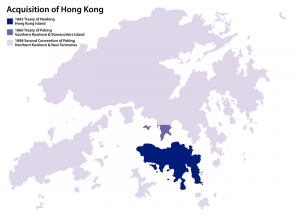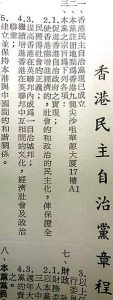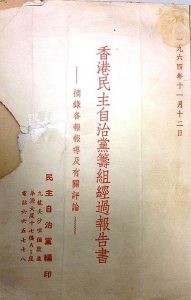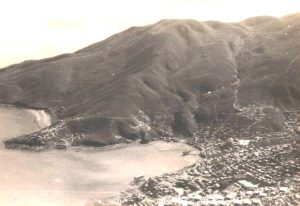Week 8: Cold War Harbor
The Young (1941, 1946–47) Plan
- July 1947 (officially shelved in 1952)
- greater Chinese membership in the Legislative and Executive Councils; establishment of municipal council (2/3 elected); localization
- Alexander Grantham (1947–57): “. . . for Hong Kong can never become independent. Either it remains a British colony, or it is re-absorbed into China as part of the province of Kwangtung.”
- Hong Kong Reform Club 香港革新會 (1949) / Hong Kong Chinese Reform Association 香港華人革新協會 (1949–) / Democratic Self-Government Party of Hong Kong 香港民主自治黨 (1964; self-governing city-state within the Commonwealth)
Post-war Transformations
- Peak Ordinances (1904/1918) repealed
- opium-smoking banned
- minimum daily wage tripled
- equal number of Chinese and European unofficial members in Executive Council
Sino-British Relations
- Official recognition (January 1950)
- “living on the edge of a volcano”
- failed tramway strike (1949)
- 1952 protests (1 dead, 100+ arrested, Ta Kung Pao temporarily shut down)
- food and water from Guangdong
Cold War
Economic Impacts
- Relocation of major firms (both expatriate and Chinese) from China
- approximately one million migrants (1946–mid 1950s) . . . pop. 2 millions (1950) . . . 2.5 millions (1955) . . .
- embargoes during the Korean War (1950–1953 . . . e.g., dried ducks)
- industrialization (30%/1953; 70%/1959)—textiles, clothing, plastic toys and flowers, flashlights and batteries, aluminum, enamel, and rattan ware, etc.
Society
- Shek Kip Mei Fire (24 December 1953) . . . 58,000
- public housing scheme (30%/1960s) . . . 120 sq ft (family of 5)
- October 1956 riots (59 dead)
- New Asia College (founded 1949 by Qian Mu [1895–1990]) . . . curriculum on Chinese culture (1953)
- “south-bound” intellectuals—e.g. Liu Yichang 劉以鬯 (1918–2018; The Drunkard 酒徒 [1963])
- Popular culture—e.g., The Greatest Civil War on Earth 南北和 (Cantonese and Mandarin; 1961)
- What did Elsie Tu consider to be the most intractable problem in post-war Hong Kong? What accounted for the differences between Elsie Tu and people such as Robert Ho Tung in how they characterized Hong Kong society?
- In Ting's telling, what accounted for the economic boom in post-war Hong Kong? Based on what you have read for this class, is his a fair description?
- If Tu and Ting happened to be in the same room, what would they say to each other? Would they have a completely different understanding of the essential characteristics of Hong Kong's society?
Top




